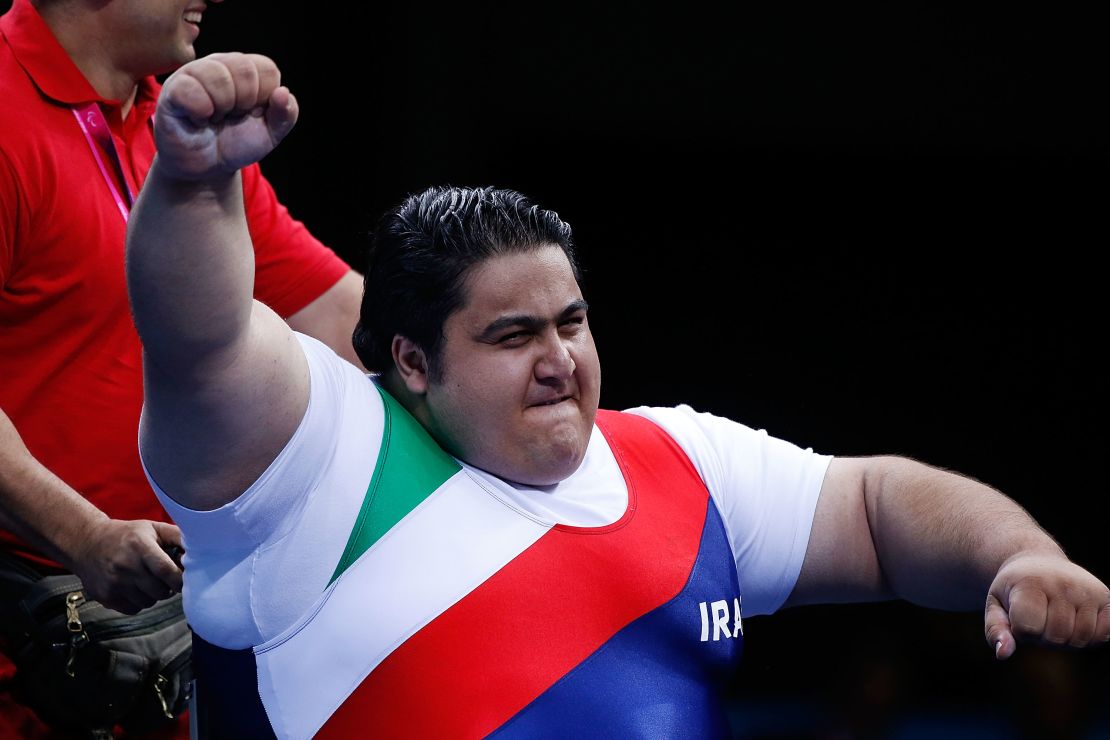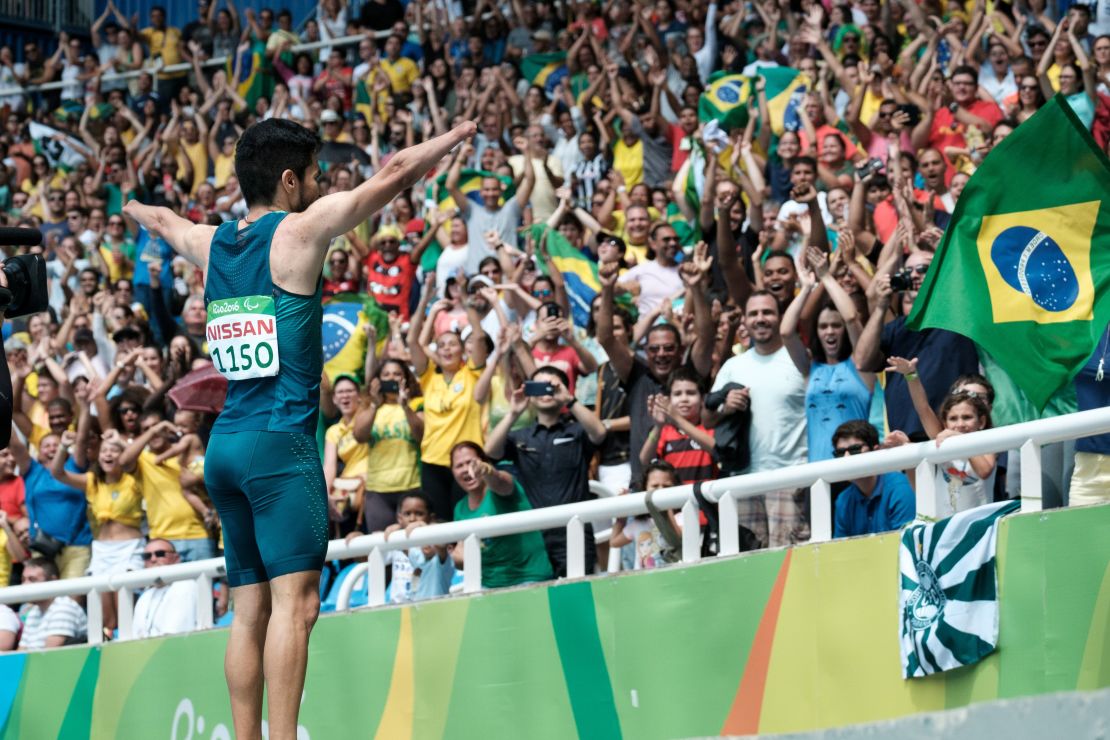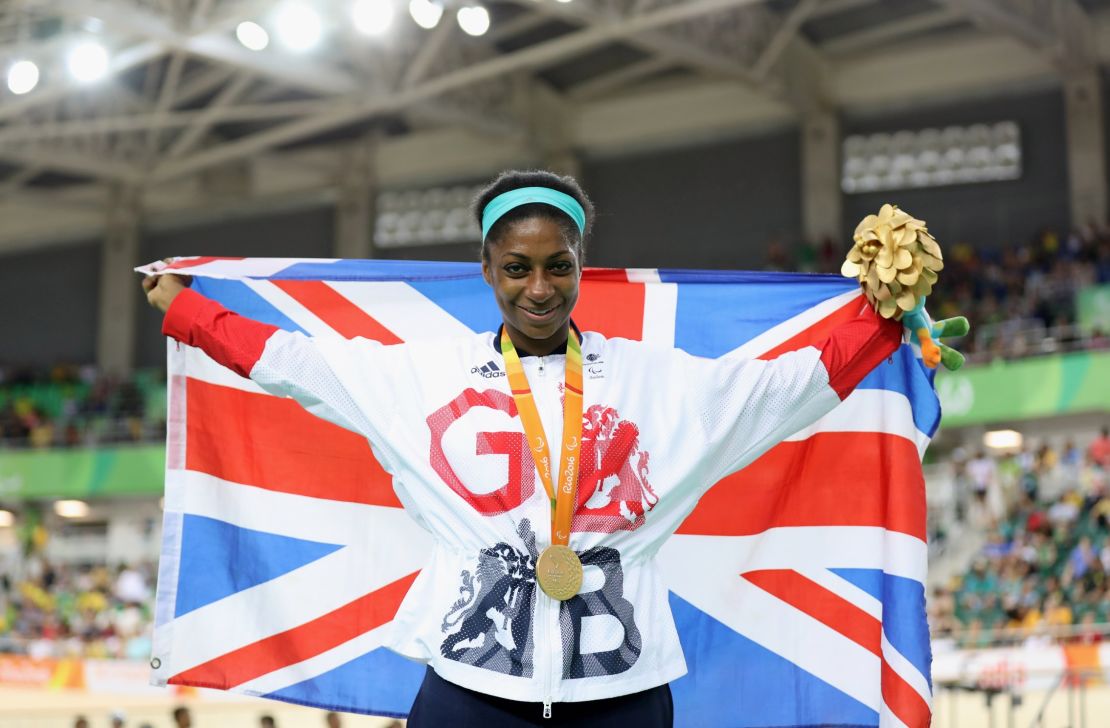Day seven in Rio saw another 54 gold medals celebrated and more records smashed, including Iranian powerlifter Siamand Rahman surpassing the 300kg mark for the first time in Paralympic history.
Peerless Siamand Rahman
Twenty-eight-year-old Siamand Rahman is the strongest Paralympian of all time.
He lifted an astonishing 310kg in the men’s +107kg category to win gold and obliterate the world record.
Never before had the magic 300kg mark been broken and, although there was a sense Rahman could achieve it tonight, his eventual score was completely unexpected.
Rahman finished an unprecedented 75kg clear of his nearest rival, almost doubling his margin of victory from London 2012.
Born without the use of his legs, Rahman’s winning total was a full 30kg heavier than it was four years ago and his latest performance adds credence to the notion he is the most dominant strength athlete in the world.
Weighing 169kg, the reigning world champion broke the world record twice before his final lift of 310kg – the equivalent of a male Siberian tiger.

Ticket sales surge
It’s looking increasingly like the ticket sales concerns prior to the Paralympics were much ado about nothing.
After announcing just 12% of tickets had been sold two weeks before the start of the Games, officials confirmed Wednesday that over two million have now been snapped up by enthusiastic Cariocas.
The carnival atmosphere in venues across Rio has now become one of the defining images of these Paralympics and the new sales figures cement Rio 2016 as the second best attended in history, behind only London 2012.
“Two million is a fabulous achievement,” Craig Spence, head of media at the International Paralympic Commitee (IPC), told the Rio 2016 website.
Read: What’s been inspiring Rio’s Paralympic ticket turnaround?
“Bearing in mind where we were at the end of August, when 200,000 were sold, to sell 10 times that in a matter of weeks shows how the cariocas (Rio residents) have embraced these Games.
“Rio 2016 and the public deserve a pat on the back for turning this into a carnival of sport. We are expecting to break all our records for TV audiences.”
However, that number is unlikely to increase much with just 180,000 tickets remaining.
“If we get close to 2.2m, we would beat our financial target and being in the two million bracket is the closest you could get to London 2012 (for which 2.7 million tickets were sold).
“For us, the jackpot is the energy in the Olympic Park every day. That perception that Paralympic sport is cool and people are having a great time is the energy to change the perception towards people with impairment.”

The Paralympic Powerlifters of Nigeria
While Nigeria hasn’t won Olympic gold since the turn of the millennium, its Paralympic powerlifters are in a class of their own.
Josephine Orji today became the ninth Nigerian to medal in Rio, breaking the world record (154kg) in the women’s +86kg division.
Seven of those nine have come under the bright lights of Riocentro Pavilion 2 where the powerlifting takes place, as Orji joins the likes of Paul Kehinde, Lucy Ejike and Bose Omolayo atop the podium.
All of the above have not just won gold, but also broken world records in the ultimate test of strength.
Roland Ezuruike, champion in the men’s -54kg competition, successfully lifted four times his own bodyweight – the equivalent of the average American male lifting 355kg.
Nigeria currently sits in an unprecedented top ten position in the medal table, but such success has prompted some to highlight the increasing disparity between Nigerian’s Olympians and their Paralympic counterparts.
Abba Yola, the former director of the National Sports Commission, even told Nigeria’s Daily Trust he hoped the Team Nigeria Paralympic contingent would “erase the shame of a dismal showing at the Olympic Games.”
One thing’s for sure, though – the Paralympic powerlifters of Nigeria are elevating their nation to greatness.
Former F1 driver wins paracycling gold on eve of 15-year anniversary of crash
He had a clear perception he had cheated death.
With less than a liter of blood left in his body, Alex Zanardi’s heart stopped seven times and he was read his last rites by a priest on the helicopter ride from the Eurospeedway to the hospital.
It was September 2001, and the Italian had been the victim of one of the most horrific crashes in the history of motorsport.
Alex Zanardi's road back to victory
Fifteen years on from the day his car and body were severed in two, the former F1 and IndyCar driver enters the history books as a three-time Paracycling gold medalist.
Making up 20 seconds on his nearest rivals after the 20km Rio Circuit’s halfway split, Zanardi was able to channel decades of racing experience to add to the golds he won on Brands Hatch circuit at London 2012.
The Italian could have turned away from elite sport forever, but his injuries have been life-changing as well as life-threatening; today, Zanardi considers his appalling accident one of the greatest opportunities of his life.
“Normally I don’t thank God for these type of things as I believe God has more important stuff to worry about, but today is too much, I had to raise my eyes and thank him,” Zanardi told reporters after the race.
“I feel my life is a never-ending privilege.”
Now a single year shy of 50, the Italian overcame men half his age to take the title, despite originally taking up the sport to keep fit.
Zanardi will go down as one of Rio’s great champions, and characterized his longevity by comparing himself to “a good Italian red wine” when speaking to CNN in the aftermath of his last Olympic triumph.
In truth, it’s one of sport’s great miracles he’s here at all.
In spikes and on a bike
The multi-talented Kadeena Cox won the T38 400m final to claim her third medal of Rio 2016.
Cox, already with C4-5 time trial gold and T38 100m bronze to her name, pulled clear of Chinese rival Chen Junfei in the last 20m to smash the world record by a second and a half.
After running a conservative first 200m, Cox came into the final straight level with Junfei and home favorite Veronica Hipolito but, as the Brazilian’s legs tied, Cox surged clear to take gold.
“I saw the Chinese girl inside me and thought ‘Oh, I’m gonna have to really work for this,’” Cox told Chanel 4. “I was stumbling all over the place but I got there.
Visit cnn.com/sport for more Paralympics news
“Off the back of the bike training I knew it (fitness) would be there. I did it!”
Initially competing as an able-bodied athlete, Cox was taken to hospital in 2014 amid fears she was suffering from a stroke. After further tests she was diagnosed with multiple sclerosis.
Read: Paralympians beat Olympic winning time
Cox’s punishing schedule of competing in both cycling and athletics is undoubtedly taking a toll on her body, but she says the hard work of physiotherapists and doctors is keeping her in racing condition.
When asked after her 100m race why she decided to compete in two sports, despite the effects it could have on her MS, Cox admitted she didn’t know what condition her body would be in for Tokyo 2020, so wants to make the most of competing at the top level while she can.
But one of the many dilemma’s multi-discipline athletes face is which group of athletes to stay with at the Olympic Village.
“I’m staying with the cyclists, they’re more fun than the athletes!”





















